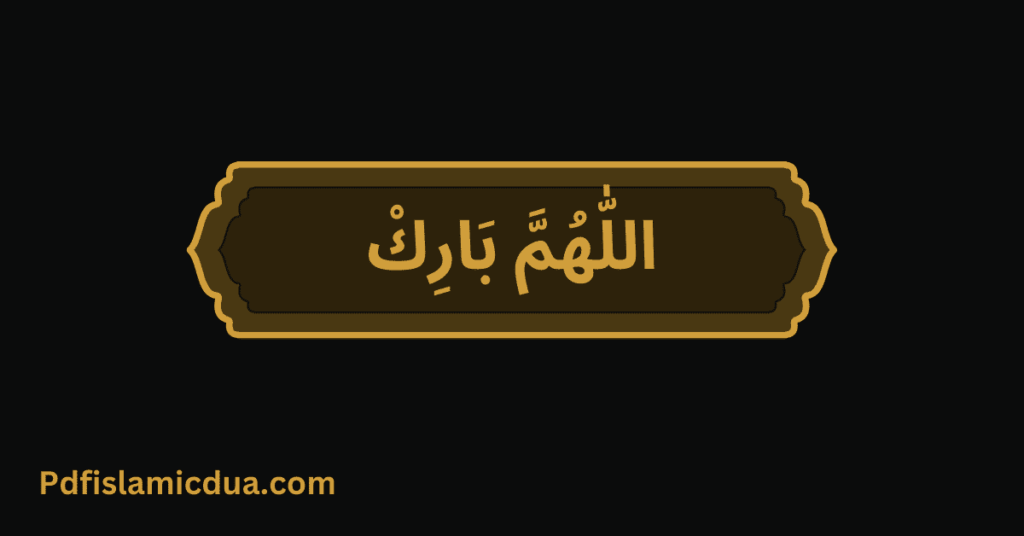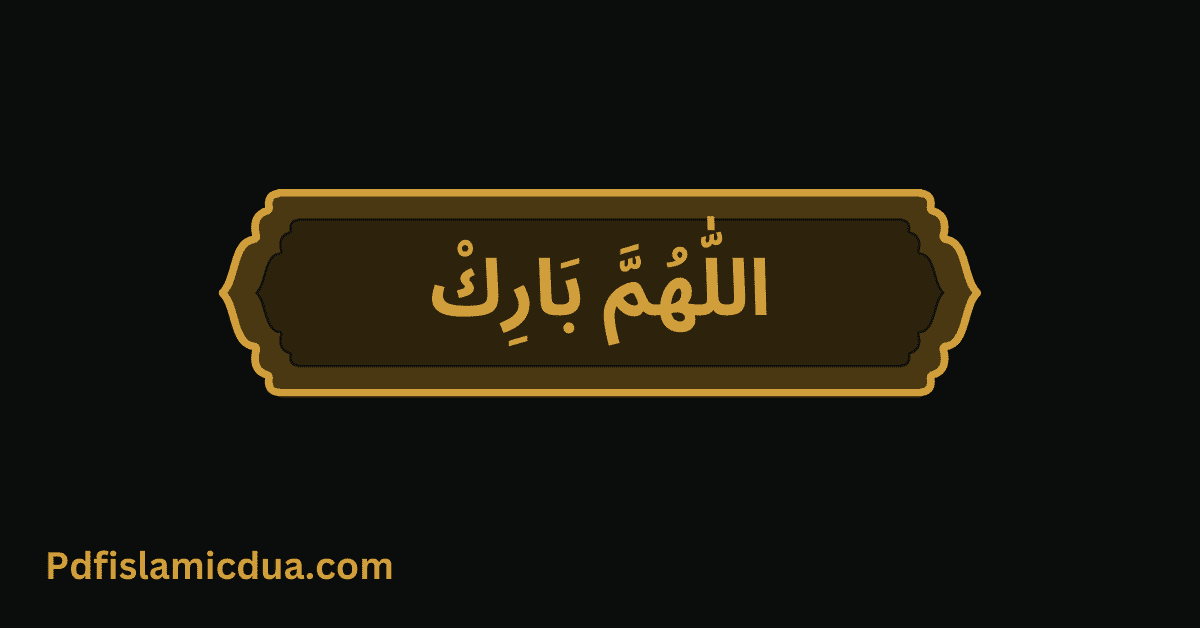Blog
allahumma barik, allahumma barik ala, allahumma barik ala muhammad, allahumma barik ala muhammad meaning, allahumma barik and mashallah, allahumma barik feek, allahumma barik feka, allahumma barik in arabic, allahumma barik lahu, allahumma barik lahu pronunciation, allahumma barik lana, allahumma barik li, allahumma barik meaning, allahumma barik pronunciation, answer to allahumma barik, define allahumma barik, dua allahumma barik lana
pdfislamicdua
0 Comments
What is the meaning of Allahumma barik?- Reply
The phrase “Allahumma Barik” holds significant meaning in Islamic tradition. It is a powerful dua (prayer) that Muslims use to ask for blessings from Allah. Commonly translated as “May Allah bless,” it is often recited in moments of admiration or to convey appreciation for something or someone.

What is the meaning of Allahumma barik?
“Allahumma Barik” is derived from the Arabic word “Barakah,” which means blessing or increase in goodness. When we say “Allahumma Barik,” we are essentially asking Allah to shower His blessings upon the person, thing, or situation we admire.
There are several variations of the phrase based on the subject:
- To a male:
Allahumma Barik Lahu – “May Allah bless him.” - To a female:
Allahumma Barik Laha – “May Allah bless her.” - For an object or general use:
Barakallahu laka fiha – “May Allah bless it.”
These variations are used in different contexts depending on the situation, the gender of the person, or the thing being blessed.
Recent Posts
- Fourth Kalima / Kalima Tawheed in Islam-Benefits
- Meaning of Allah in English – Arabic Explanation
- Amana Rasul PDF in English Meaning- Transliteration
- Second Kalima Shahada with Translation and Benefits
- First Kalima (1st Kalma) – Pillar of Islam
Usage in Hadith and Islamic Tradition
1. Marriage Blessing:
One of the common scenarios in which “Allahumma Barik” is used is when congratulating newlyweds. The Sunnah (practice) of the Prophet Muhammad (peace be upon him) is to say:
“Allahumma barik lahum wa barik alaihim”
(O Allah, bless them and bestow blessings upon them).
This dua is preferred over popular phrases like wishing the couple many children. The importance of this blessing is highlighted in Sunan Ibn Majah, Hadith 1906 (Grade: Hasan), where the Prophet taught this supplication to newlyweds.
2. Durood Sharif:
The phrase “Allahumma Barik” is also part of the Durood Sharif, a prayer to send blessings upon the Prophet Muhammad (peace be upon him) and his family. The full Durood includes the following:
“Allahumma Salli ala Muhammadin wa ala aali Muhammadin… Allahumma barik ala Muhammadin wa ala aali Muhammadin”
(O Allah, bless Muhammad and the people of Muhammad).
This prayer is recited by Muslims globally, especially during their Salah (prayers) and when invoking blessings upon the Prophet.
3. Dua After Eating or Drinking:
The Prophet Muhammad (peace be upon him) also taught us to say “Allahumma Barik” after consuming food or drink. For instance, after drinking milk, he advised saying:
“Allahumma barik lana fihi wa at`imna khairan minhu”
(O Allah, bless us in it and give us better than it).
This hadith can be found in Sunan Abi Dawud, Hadith 3730 (Grade: Hasan), emphasizing the importance of seeking blessings from Allah in all aspects of life, including the simple act of eating or drinking.
Everyday Usage of Allahumma Barik
“Allahumma Barik” is commonly used in everyday conversations as a way to show admiration or give compliments. Some examples include:
- Compliments:
When someone notices something admirable in another person, such as their appearance or achievements, they may say,
“You are glowing, Allahumma Barik.” - Blessings for Loved Ones:
It is also frequently used to pray for blessings for family members, friends, or anyone we care about. For instance, when someone performs a kind act or helps you, you might say,
“Allahumma Barik, may Allah bless you for your kindness.”
In addition, saying “Allahumma Barik” is recommended when admiring something to protect it or the person from the evil eye (jealousy or envy). This practice is based on the hadith:
“If one of you sees something with his brother that he admires, let him pray for blessing (barakah) for him.”
(Narrated by Imam Malik, Ahmad, and Ibn Majah – 3509).
What is the meaning of Allahumma barik?- Reply
When someone says “Allahumma Barik” to you, it is customary to respond with gratitude. Here are a few appropriate responses:
- Barakallahu Feek (بارك الله فيك):
This Arabic phrase translates to “And may Allah bless you.” It is a beautiful reply and also carries the benefit of increasing one’s noble deeds. This response is in line with the Sunnah of Prophet Muhammad (peace be upon him). - Ameen (آمين):
Another simple and common reply is “Ameen”, which means “May it be so.” This is a short but powerful affirmation of the blessing being invoked upon you. - JazakAllah Khair (جزاك الله خيرًا):
This phrase means “May Allah bless you with the best reward.” It is a polite and appreciative way to thank someone who has requested blessings from Allah for you.
The Importance of Saying Allahumma Barik
Saying “Allahumma Barik” is more than just a simple phrase; it carries deep spiritual significance:
- Protection from the Evil Eye:
It shields against the harmful effects of envy, which is a common concern in many cultures. - Increases Noble Virtues:
Each time you say it, it adds to your good deeds, as you are invoking blessings upon others. - Practicing Sunnah:
Following the teachings of the Prophet Muhammad (peace be upon him) by using this dua in everyday situations helps to strengthen your connection to the Sunnah. - Fostering Kindness and Positivity:
Using “Allahumma Barik” encourages positive interactions and spreads goodwill among people, fostering a sense of community and care. - Promotes Humility:
Instead of letting admiration lead to jealousy, saying “Allahumma Barik” helps in curbing negative emotions like envy and promotes humility and gratitude.
Conclusion
“Allahumma Barik” is a versatile and meaningful phrase that serves multiple purposes: seeking blessings from Allah, protecting others from envy, and spreading positivity. Its usage in Islamic tradition, particularly in moments of admiration and gratitude, reflects the essence of kindness and goodwill. Whether you’re complimenting someone, congratulating newlyweds, or appreciating an act of kindness, saying “Allahumma Barik” can transform everyday moments into opportunities for seeking Allah’s blessings.














Post Comment